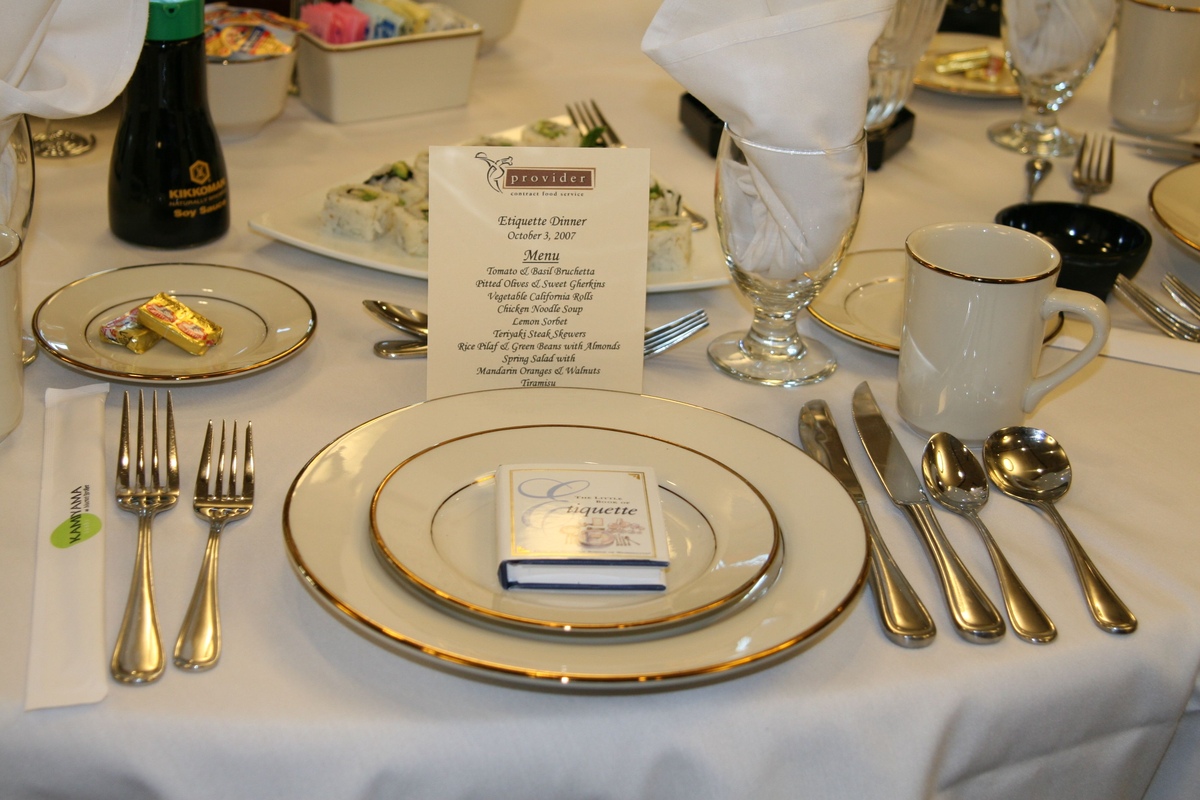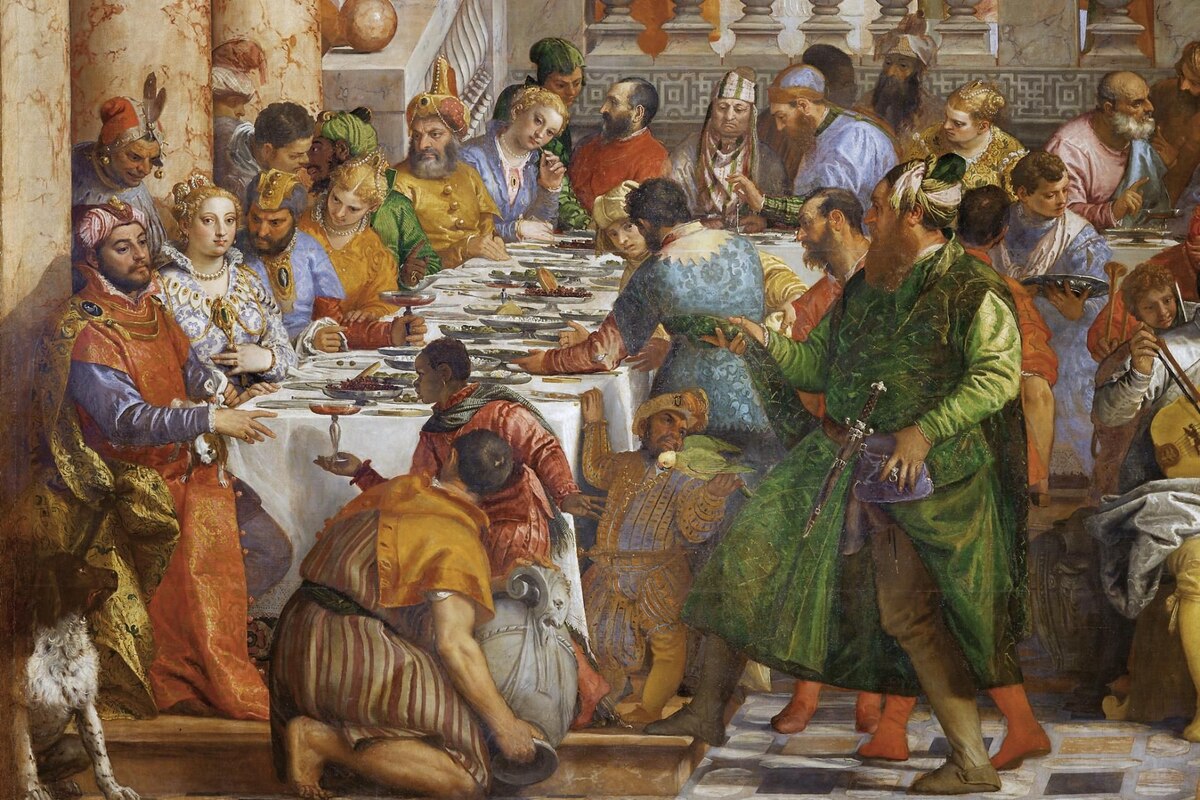Home>Dining>Events & Etiquette>What Does The Bible Say About Table Manners?


Events & Etiquette
What Does The Bible Say About Table Manners?
Modified: January 9, 2024
Discover what the Bible teaches about table manners and etiquette for various events. Gain insight on the significance of events etiquette according to Scripture.
(Many of the links in this article redirect to a specific reviewed product. Your purchase of these products through affiliate links helps to generate commission for Storables.com, at no extra cost. Learn more)
Introduction
Table manners play an important role in our daily lives, influencing the way we interact with others and the impression we leave on them. While etiquette is often seen as a matter of social norms and cultural customs, the Bible also offers guidance on how we should conduct ourselves at the table. In this article, we will explore what the Bible says about table manners and how we can apply these teachings to our modern lives.
Throughout the scriptures, we find numerous references to meals and dining, showcasing the significance of communal meals in ancient times. These occasions were not merely about nourishment but also served as opportunities for fellowship and building relationships. At the same time, table manners were an expression of respect, gratitude, and hospitality.
By examining the key scriptures on table manners and the teachings of Jesus and the apostle Paul, we can glean valuable insights into how we should conduct ourselves at the table. Additionally, we will explore the symbolic significance of meals in the Bible and delve into the examples set by biblical figures in regards to table etiquette.
While cultural customs and expectations regarding table manners may vary across different societies and time periods, the underlying principles outlined in the Bible remain relevant. By incorporating these principles into our own dining experiences, we can enhance our relationships, demonstrate respect for others, and create an atmosphere of love and hospitality.
So let us embark on this journey through the pages of the Bible to discover the wisdom it offers on table manners and how we can apply these teachings in our modern lives.
Key Takeaways:
- Embrace biblical principles of hospitality, gratitude, and inclusivity to create meaningful dining experiences that honor God and foster love and respect for others.
- Apply timeless teachings on humility, servanthood, and generosity to modern table manners, transforming meals into opportunities for fellowship and unity.
Read more: What Does The Bible Say About Seeds
Importance of Table Manners in the Bible
Table manners, or the way we conduct ourselves at the table, hold deep significance in the Bible. They are not just about having good etiquette but reflect our attitudes towards others and our relationship with God.
One of the fundamental principles underlying the importance of table manners in the Bible is the act of hospitality. In ancient times, offering food and drink to guests was a crucial cultural practice. It was considered a sign of generosity, kindness, and respect. The act of sharing a meal was seen as an opportunity to provide nourishment and create a sense of fellowship.
We see examples of this throughout the Bible, such as when Abraham extended hospitality to three visitors in Genesis 18. Abraham not only offered them food and drink but also provided a place for them to rest and refresh themselves. This act of hospitality reflected Abraham’s reverence for God and his desire to treat others with kindness and generosity.
Furthermore, table manners in the Bible are associated with gratitude. When we partake in a meal, it is important to express gratitude for the provisions we have received. This attitude of thankfulness is deeply rooted in the scriptures.
In Jesus’ teachings, we see this emphasis on gratitude in the account of the feeding of the five thousand in Matthew 14:19. Before distributing the loaves and fishes to the multitude, Jesus gave thanks for the food. This act of giving thanks not only acknowledged God’s provision but also set an example for his disciples and for future believers to express gratitude before partaking in a meal.
In addition to hospitality and gratitude, table manners in the Bible are connected to humility and selflessness. Jesus often emphasized the importance of serving others and putting their needs before our own. This notion is encapsulated in his statement, “Whoever wants to be great among you must be your servant” (Mark 10:43).
When we exhibit good table manners, such as ensuring that everyone is served before us or offering food to others before taking it for ourselves, we demonstrate humility and a willingness to serve. This echoes Jesus’ teachings and reflects the selfless love that God calls us to embody.
Overall, the importance of table manners in the Bible extends beyond mere social niceties. It encompasses aspects of hospitality, gratitude, humility, and selflessness. By adhering to these principles, we not only honor God but also create an atmosphere of love and fellowship in our dining experiences.
Key Scriptures on Table Manners
The Bible provides us with several key scriptures that offer guidance and wisdom when it comes to table manners. These verses serve as a foundation for understanding how we should conduct ourselves at the table and interact with others during mealtime.
1. Proverbs 15:17: “Better a small serving of vegetables with love than a fattened calf with hatred.” This verse emphasizes the importance of the atmosphere and attitude at the table. It reminds us that the quality of our relationships and the love we share are more significant than the abundance of food. It encourages us to prioritize love, joy, and harmony over material indulgence during mealtime.
2. Proverbs 23:1-3: “When you sit to dine with a ruler, note well what is before you, and put a knife to your throat if you are given to gluttony. Do not crave his delicacies, for that food is deceptive.” This passage warns against overindulgence and greediness. It reminds us to approach meals with moderation and self-control, especially in situations where we are dining in the presence of those in authority.
3. Luke 14:7-11: “When he noticed how the guests picked the places of honor at the table, he told them this parable: ‘When someone invites you to a wedding feast, do not take the place of honor, for a person more distinguished than you may have been invited. If so, the host who invited both of you will come and say to you, “Give this person your seat.” Then, humiliated, you will have to take the least important place. But when you are invited, take the lowest place, so that when your host comes, he will say to you, “Friend, move up to a better place.” Then you will be honored in the presence of all the other guests.'” This passage teaches us the importance of humility and avoiding self-promotion. It encourages us to take a modest seat at the table and allow others to be honored, rather than seeking personal recognition or status.
4. 1 Corinthians 11:23-26: In these verses, the apostle Paul provides instructions on the Lord’s Supper, a significant communal meal in Christian traditions. They remind us of the importance of partaking in this meal with reverence, remembrance, and unity. They highlight the need for self-examination and a sincere heart when coming to the Lord’s table, emphasizing the spiritual significance of the meal rather than mere physical nourishment.
These scriptures, among others, offer guidance on various aspects of table manners, including the importance of love, moderation, humility, and the spiritual significance of meals. By exploring and reflecting on these passages, we can gain a deeper understanding of how our conduct at the table reflects our relationship with God and others.
The Symbolic Significance of Meals in the Bible
In the Bible, meals hold significant symbolic meaning, representing more than just the act of nourishment. They serve as powerful symbols of fellowship, provision, and divine presence. Exploring the symbolic significance of meals in the scriptures allows us to grasp a deeper understanding of their role in our spiritual lives.
One of the primary symbols associated with meals in the Bible is fellowship. Sharing a meal is a communal experience that fosters unity, bonding, and the building of relationships. Throughout the scriptures, we see numerous accounts of people coming together to share meals, whether it be the Passover feast, communal feasts, or Jesus’ ministry of dining with sinners.
Meals also carry the symbolism of provision. In the wilderness, God provided manna from heaven to sustain the Israelites during their journey. The feeding of the five thousand by Jesus demonstrated his miraculous provision and abundance. These examples showcase God’s faithfulness in providing for His people, both physically and spiritually.
Moreover, meals in the Bible often serve as a reminder of God’s covenant and presence. The Passover meal, for example, commemorates the Israelites’ liberation from Egypt and signifies their covenant relationship with God. Jesus’ institution of the Lord’s Supper during the Last Supper further emphasizes the symbolic connection between meals and the covenant relationship with God.
Meals also hold eschatological symbolism, pointing towards the ultimate fulfillment of God’s kingdom. The concept of the Messianic banquet, depicted in Isaiah 25:6-9 and Revelation 19:6-9, portrays a glorious feast where all believers will gather to partake in the abundance of God’s kingdom. This image symbolizes the joyous and eternal fellowship with God and fellow believers in the age to come.
Understanding the symbolic significance of meals in the Bible helps us recognize the deeper spiritual truths embedded in the act of dining together. It reminds us of the sacredness of communal meals and the opportunity they provide for fellowship, provision, and experiencing the presence of God.
As we engage in our own meals and gatherings, we can be mindful of these symbols and seek to emulate the spirit of unity, gratitude, and reverence for God’s provision and presence. By doing so, we not only honor the biblical symbolism of meals but also create a space where others can experience the transformative power of dining in fellowship and communion with God.
Jesus’ Teachings on Table Manners
Jesus’ teachings on table manners provide us with valuable insights into how we should conduct ourselves during meals and interact with others in a way that reflects God’s love and grace. His actions and words at the table exemplify key principles of humility, inclusivity, and love.
Jesus often chose to eat with tax collectors, sinners, and outcasts, shocking the religious leaders of his time. By doing so, he demonstrated the importance of inclusivity and compassion. Jesus’ table fellowship communicated a powerful message of acceptance and love, breaking down barriers and challenging societal norms.
In Luke 14:12-14, Jesus taught his disciples and those around him about true hospitality. He advised them not to invite only those who could repay them, but rather to invite the poor, the crippled, the lame, and the blind. This teaching emphasized the importance of showing kindness and hospitality to those who are often overlooked or marginalized.
Jesus also taught about the importance of humility and service. In John 13:3-17, at the Last Supper, Jesus washed his disciples’ feet, a task typically performed by servants. This act of humility and service demonstrated Jesus’ love for his disciples and served as a powerful example for them to follow. Jesus emphasized that greatness in the kingdom of God is found in serving others.
Furthermore, Jesus often used mealtime as a backdrop to teach spiritual truths. In Matthew 15:10-20, Jesus taught his disciples and the crowd about the importance of what comes out of a person’s heart, rather than what goes into their mouth. He used the metaphor of food entering the body to symbolize the defilement of sinful thoughts and intentions. This teaching highlighted the significance of inner purity and the transformative power of God’s grace.
Another profound teaching on table manners comes from Jesus’ institution of the Lord’s Supper during the Last Supper. In Matthew 26:26-28, Jesus took bread, blessed it, and gave it to his disciples, saying, “Take, eat; this is my body.” He then took the cup, gave thanks, and said, “Drink from it, all of you. This is my blood of the covenant, which is poured out for many for the forgiveness of sins.” This act established the practice of communion, reminding believers of Jesus’ sacrificial death and the forgiveness of sins offered through his body and blood.
Jesus’ teachings on table manners call us to embody humility, love, inclusivity, and service. They remind us to prioritize the needs of others, extend hospitality to all, and see mealtimes as opportunities to express God’s grace and compassion. By following Jesus’ example, we can create an atmosphere of love, unity, and transformation during our own meals and gatherings.
When dining, follow the example of Jesus by showing gratitude, sharing with others, and being considerate of those around you. The Bible emphasizes humility and serving others, so practice good manners at the table.
Read more: What Does The Bible Say About Crop Rotation
Paul’s Instructions on Table Etiquette
The apostle Paul, in his letters to various early Christian communities, provided instructions on table etiquette that reflect his concern for unity, love, and proper conduct during meals. His teachings offer practical guidance on how believers should approach communal dining with reverence and consideration for others.
In 1 Corinthians 11:17-34, Paul addresses the abuses and divisions that were taking place during the church’s communal meals, often referred to as the Agape feasts or love feasts. Paul expresses his disappointment and rebukes the Corinthian believers for their self-centered and divisive behavior. He emphasizes the need for unity and mutual respect, particularly during these communal meals.
Paul instructs the Corinthians to wait for one another before eating, rather than indulging in a self-centered and selfish manner. He highlights the importance of considering the needs and hunger of fellow believers and warns against participating in the meals in an unworthy manner. This reflects Paul’s concern for maintaining the dignity and unity of the body of Christ, even in the context of shared meals.
Furthermore, Paul addresses the issue of social distinctions and divisions during meals in his letter to the Galatians. In Galatians 2:11-14, Paul recounts an incident where he confronted Peter for his hypocrisy in segregating himself from Gentile believers at mealtime. Paul denounces the hypocrisy and reminds Peter that in Christ, there is no distinction between Jew and Gentile. This admonition reinforces the principle that communal meals should be a place of inclusivity, where all believers are treated equally and without discrimination.
Paul also emphasizes the importance of giving thanks for the food we receive. In 1 Timothy 4:4-5, Paul writes, “For everything created by God is good, and nothing is to be rejected if it is received with thanksgiving, for it is made holy by the word of God and prayer.” This instruction highlights the need for gratitude and recognizing God’s provision for our sustenance. It encourages believers to approach meals with a thankful attitude, acknowledging God’s goodness and generosity.
Overall, Paul’s instructions on table etiquette emphasize the principles of unity, inclusivity, mutual respect, and gratitude. His teachings remind us to approach communal meals with reverence, considering the needs of others and fostering an atmosphere of love and unity. By following Paul’s instructions, we can contribute to the spiritual growth and edification of the body of Christ during our shared meals and gatherings.
Lessons from Biblical Figures Regarding Table Manners
Biblical figures serve as examples from which we can draw valuable lessons regarding table manners and conduct during meals. Their actions and attitudes at the table provide us with insights on how to honor God, show hospitality, and foster meaningful relationships.
One such example is found in the story of Abraham and the three visitors in Genesis 18. When Abraham saw the visitors approaching, he ran to meet them and offered them a place to rest and refresh themselves. He demonstrated extraordinary hospitality, providing them with a meal consisting of bread, meat, and milk. Abraham’s actions remind us of the importance of welcoming guests, ensuring their comfort, and being generous in our provision during meals.
Another biblical figure who exemplified proper conduct at the table is Daniel. In the book of Daniel, we learn that Daniel and his friends refused to defile themselves with the king’s food and wine. They requested to be allowed to eat only vegetables and drink water. This decision was based on their commitment to honoring God and following His dietary laws. Daniel’s example teaches us the importance of commitment to our faith and honoring God’s principles even in our dining choices.
The Lord Jesus Himself set a remarkable example of table manners. He consistently demonstrated love, humility, and inclusivity in his interactions with others during mealtimes. Jesus often shared meals with tax collectors, sinners, and outcasts, showing acceptance and compassion. His actions challenged societal norms and emphasized the importance of demonstrating God’s love and grace during communal meals.
Another significant mealtime event is the Last Supper, where Jesus washed the feet of his disciples. This act of humility and service serves as a powerful lesson for us. It teaches us the importance of putting others’ needs before our own, fostering an atmosphere of love and unity while humbly serving those around us.
The early Christian community depicted in the book of Acts also provides us with valuable lessons in table manners. In Acts 2:42-47, we see that believers gathered together, breaking bread and sharing meals in a spirit of unity and generosity. They sold their possessions and distributed the proceeds among those in need, selflessly showing hospitality and care for one another.
These biblical figures remind us of the importance of extending hospitality, honoring God’s principles, showing love and inclusivity, and serving others during meals. Their examples inspire us to create an atmosphere of fellowship, gratitude, and generosity in our own dining experiences.
By incorporating these lessons into our table manners and conduct during meals, we can reflect the character of Christ, foster meaningful relationships, and honor God in our interactions with others.
Applying Biblical Principles to Modern Table Manners
The principles and teachings on table manners found in the Bible are not outdated or irrelevant; rather, they provide timeless guidance that can be applied to our modern dining experiences. By incorporating these biblical principles into our table manners, we can create an atmosphere of love, respect, and fellowship, while honoring God and demonstrating gratitude.
One key principle that we can apply is the principle of hospitality. Just as Abraham welcomed and provided for his visitors, we can extend hospitality to our guests by ensuring their comfort, offering food and drink, and creating a welcoming environment. Hospitality goes beyond mere provision; it involves opening our hearts and creating an atmosphere of warmth and acceptance.
Another important principle is humility and servanthood. As Jesus washed the feet of his disciples, we can demonstrate humility and servanthood by serving others before ourselves. This can be as simple as ensuring that everyone is served before we begin eating or offering to help clear the table after the meal. By putting the needs of others above our own, we reflect the selfless love of Christ.
Gratitude is another biblical principle that can be applied to our table manners. Just as Jesus gave thanks before distributing the bread and wine at the Last Supper, we can express gratitude for the food we receive. Offering a heartfelt prayer of thanks before the meal not only acknowledges God’s provision but also sets a tone of gratefulness and appreciation.
Inclusivity is a vital biblical principle that we can apply to modern table manners. Jesus shared meals with tax collectors, sinners, and outcasts, demonstrating that all are welcome at his table. We can follow this example by showing inclusivity and hospitality to people from all walks of life, regardless of their social status, background, or beliefs. Our dining experiences can become opportunities for unity and building relationships across diverse individuals.
Furthermore, we can incorporate the principle of generosity into our modern table manners. The early Christian community in Acts 2:42-47 exemplified this by sharing their meals and resources with one another. We can emulate their spirit of generosity by hosting potluck meals, donating to food banks, or inviting others to join us for a meal. These acts of generosity demonstrate God’s love and care for others.
By applying these biblical principles to our modern table manners, we can create a dining experience that reflects the character of Christ. Our meals can become occasions for fellowship, gratitude, inclusivity, and generosity. As we embrace these principles, we not only honor God, but we also create an environment where others feel valued, loved, and accepted.
So let us seek to incorporate these biblical principles into our table manners, cultivating an atmosphere of love, respect, and gratitude as we share meals with others.
Conclusion
In the realm of table manners, the Bible offers invaluable guidance that transcends cultural norms and societal expectations. The principles and teachings found within its pages shape our understanding of hospitality, gratitude, humility, inclusivity, and love during meals. By incorporating these biblical principles into our modern table manners, we can create meaningful dining experiences that honor God, foster fellowship, and demonstrate love and respect for others.
Table manners in the Bible are not merely about following a set of rules or adhering to social customs; they encompass deeper principles that reflect our relationship with God and our interactions with others. Hospitality, as exemplified by Abraham and Jesus, calls us to welcome and care for others, creating an atmosphere of warmth and acceptance.
Humility and servanthood, modeled by Jesus washing the feet of his disciples, remind us to put the needs of others before our own, serving with a selfless heart. Gratitude, demonstrated by Jesus giving thanks before meals, teaches us to express gratitude to God for his provision and to embrace a thankful attitude in all circumstances.
Inclusivity, seen through Jesus’ example of dining with sinners and outcasts, challenges us to break down barriers and extend hospitality to all, regardless of social status or background. Finally, the spirit of generosity, exemplified by the early Christian community, encourages us to share our meals and resources with others, showcasing God’s love and care.
As we apply these biblical principles to our modern table manners, we create an environment that reflects the character of Christ. Our meals become opportunities for fellowship, unity, and building relationships. Whether we are gathered with family, friends, or even strangers, our conduct at the table can demonstrate love, respect, and gratitude.
Let us strive to embody the teachings of the Bible in our dining experiences, making them a reflection of our faith and an expression of God’s love. By cultivating an atmosphere of hospitality, humility, gratitude, inclusivity, and generosity, we can truly honor God and create spaces where others feel valued, loved, and accepted.
So as we gather around the table, let us remember the wisdom of the Bible and allow it to guide our table manners. May our meals be filled with joy, fellowship, and an enduring spirit of love that reflects the teachings of our Lord and Savior, Jesus Christ.
Frequently Asked Questions about What Does The Bible Say About Table Manners?
Was this page helpful?
At Storables.com, we guarantee accurate and reliable information. Our content, validated by Expert Board Contributors, is crafted following stringent Editorial Policies. We're committed to providing you with well-researched, expert-backed insights for all your informational needs.















0 thoughts on “What Does The Bible Say About Table Manners?”